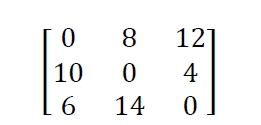
 Data Structure
Data Structure Networking
Networking RDBMS
RDBMS Operating System
Operating System Java
Java MS Excel
MS Excel iOS
iOS HTML
HTML CSS
CSS Android
Android Python
Python C Programming
C Programming C++
C++ C#
C# MongoDB
MongoDB MySQL
MySQL Javascript
Javascript PHP
PHP
- Selected Reading
- UPSC IAS Exams Notes
- Developer's Best Practices
- Questions and Answers
- Effective Resume Writing
- HR Interview Questions
- Computer Glossary
- Who is Who
C++ Program to Implement Johnson’s Algorithm
Here we will see the Johnson’s Algorithm to find shortest path between two vertices.


The graph is given here. The shortest path between the edges is like below. This program will take the number of vertices, number of edges, and the edges with their costs.
Input − Vertices: 3
Edges: 5
Edge with costs −
1 2 8
2 1 12
1 3 22
3 1 6
2 3 4
Output − The distance matrix of the graph.
| 0 | 8 | 12 |
| 10 | 0 | 4 |
| 6 | 14 | 0 |
Algorithm
johnsonAlgorithm(cost)
Input − The cost matrix of given Graph.
Output − Matrix to for shortest path between any vertex to any vertex.
Begin Create another matrix ‘A’ same as cost matrix, if there is no edge between ith row and jth column, put infinity at A[i,j]. for k := 1 to n, do for i := 1 to n, do for j := 1 to n, do A[i, j] = minimum of A[i, j] and (A[i, k] + A[k, j]) done done done display the current A matrix End
Example
#include<iostream>
#define INF 9999
using namespace std;
int min(int a, int b);
int cost[10][10], adj[10][10];
inline int min(int a, int b){
return (a<b)?a:b;
}
main() {
int vert, edge, i, j, k, c;
cout << "Enter no of vertices: ";
cin >> vert;
cout << "Enter no of edges: ";
cin >> edge;
cout << "Enter the EDGE Costs:\n";
for (k = 1; k <= edge; k++) { //take the input and store it into adj and cost matrix
cin >> i >> j >> c;
adj[i][j] = cost[i][j] = c;
}
for (i = 1; i <= vert; i++)
for (j = 1; j <= vert; j++) {
if (adj[i][j] == 0 && i != j)
adj[i][j] = INF; //if there is no edge, put infinity
}
for (k = 1; k <= vert; k++)
for (i = 1; i <= vert; i++)
for (j = 1; j <= vert; j++)
adj[i][j] = min(adj[i][j], adj[i][k] + adj[k][j]); //find minimum path from i to j through k
cout << "Resultant adj matrix\n";
for (i = 1; i <= vert; i++) {
for (j = 1; j <= vert; j++) {
if (adj[i][j] != INF)
cout << adj[i][j] << " ";
}
cout << "\n";
}
}
Output
Enter no of vertices: 3 Enter no of edges: 5 Enter the EDGE Costs: 1 2 8 2 1 12 1 3 22 3 1 6 2 3 4 Resultant adj matrix 0 8 12 10 0 4 6 14 0

Advertisements
